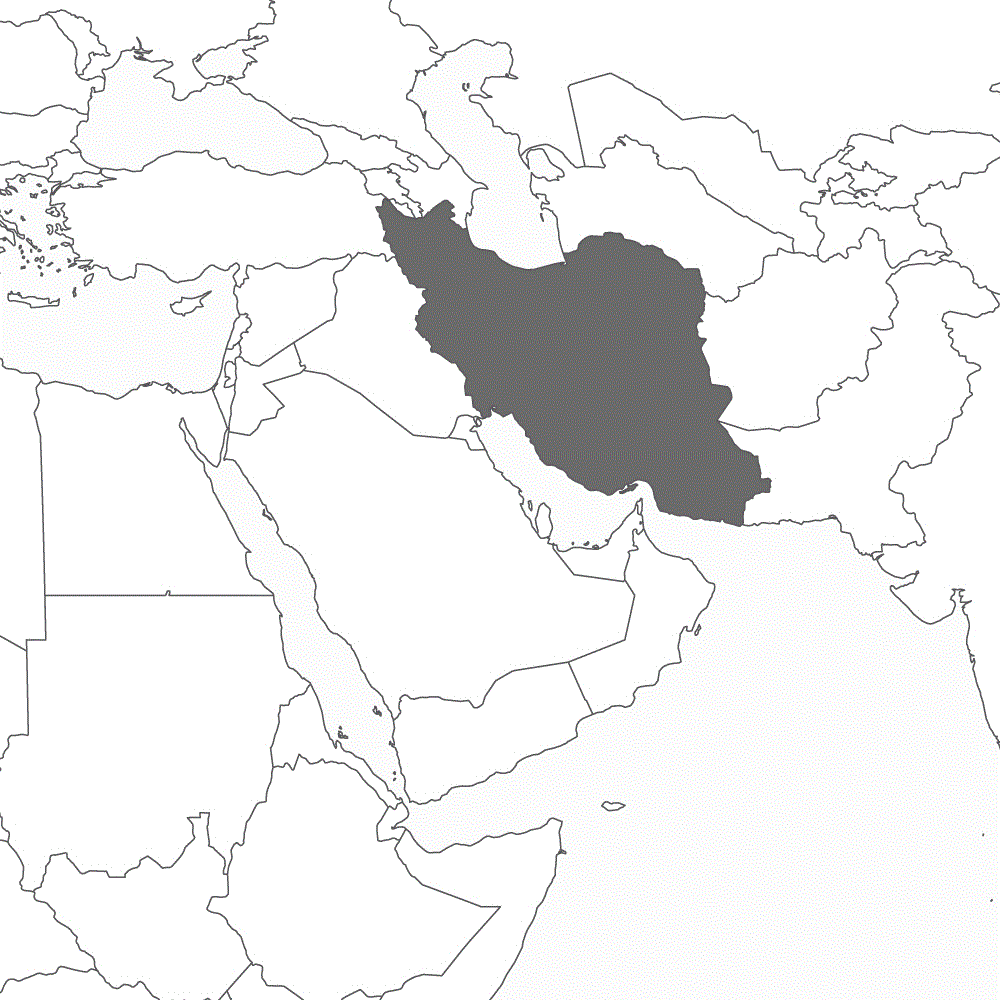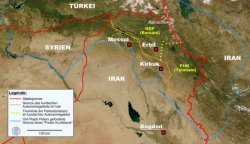Lever for Destabilization
ERBIL/TEHERAN/COLOGNE (Own report) - Germany is supporting armed separatists in Western Iran, in their struggle against the Iranian government. In spite of repeated protests from Teheran, a leader of the Kurdish secessionist movement is continuing to recruit insurgents in Germany - in plain view of German intelligence services. The separatists are held responsible for the killing several hundred Iranian soldiers. A professor of the Bundeswehr Academy in Munich is pleading for supporting the insurgents: Iran should be weakened and "if necessary disbanded". German aid to Kurdish insurgents is complementing German contacts to the Kurdish autonomous government in Iraq and is strengthening Berlin's role in the framework of a possible ethnic reorganization of the entire Middle East. Plans to this effect were drawn up by the US military quite a while ago. Currently Masoud Barzani, president of Iraq's "Kurdish Autonomous Region", is the most aggressive proponent of Kurdish secessionism. For a long time, he has also been the contact person for German foreign policy experts, and has already met with Angela Merkel on various occasions.
Masoud Barzani, has already announced the secession of the northern Iraqi territory under his control ("Iraqi Kurdistan") and would like to expand this territory to include the three oil rich provinces of Kirkuk, Niniveh and Diyala. A referendum is planned this year in all three provinces to decide on the accession to the "Kurdish Autonomous Region". These secessionist plans are causing serious tensions in Kirkuk, already leading to ethnic violence and terrorist attacks. If he cannot take control of Kirkuk by referendum, Masoud Barzani has already announced a civil war.
Erbil
The clan of Masoud Barzani, the president of the Kurdistan Democratic Party (KDP), is in control of the northern areas of the secessionist region. As President of the Kurdish autonomous government, Barzani is also controlling the other regions of "Iraqi Kurdistan" and since decades has had close relations with Germany. In the 1980's, he has had vivid exchange with Franz-Josef Strauß, chairman at the time of the (Christian Democratic) CSU. In the1990's he made contact with the government of the German federal state North Rhine Westphalia, which had financed several development projects in Northern Iraq. Important strategic military infrastructural projects (the "Barzani Road") were being discussed at the time.[1] The former parliamentarian of North Rhine Westphalia, Siegfried Martsch (Green Party), was one of the persons contacted at the time. He then became a member of the Barzani-Clan and is today allowed to call himself "Siggi Barzani". Martsch is director of the German branch of the official investment agency in Northern Iraq ("Kurdistan Development Corporation") and has arranged infrastructure contracts, worth millions of Euros, for German corporations. In January 2006, he represented Germany at the inauguration of the "German Cultural Centre" in Erbil, the capital of "Iraqi Kurdistan". Susanne Osthoff, an assistant of the German Foreign Ministry, had been helping to organize the center, until she was kidnapped a few weeks before the inauguration. She is suspected of working as an informant of the German Federal Intelligence Service, BND.[2]
Kandil Mountains
The Kandil Mountains, within Barzani's sphere of influence, located in the border regions of Iraq, Iran and Turkey, are the staging areas from  which the PKK separatist militia regularly launches attacks against Turkish territory. The main base of the PEJAK, the "Party for a Free Life in Kurdistan", which is closely affiliated to the PKK, is also located in the Kandil Mountains. PEJAK is fighting the Iranian Army in western Iran. This organization, operating out of the region under the influence of Barzani, the German contact, is fighting a war for an ethnically homogenous "Kurdistan". It is estimated that more than 300 Iranian soldiers have already been killed in this war. The German television magazine "Monitor" reported that PEJAK Chief, Abdul Rahman Haji Ahmadi, has his headquarters in Cologne (North Rhine Westphalia), from which he recruits insurgents for the secessionist war against Iran.[3]. According to this report, in spite of repeated complaints by the Iranian government, Haji Ahmadi is allowed, without interference from German authorities, to regularly travel to his militia in Iraq. The German BND is said to have shady relations with PEJAK.[4] (The map shows the Kandil Mountains in the North of Iraq. Click here for an enlarged version.)
which the PKK separatist militia regularly launches attacks against Turkish territory. The main base of the PEJAK, the "Party for a Free Life in Kurdistan", which is closely affiliated to the PKK, is also located in the Kandil Mountains. PEJAK is fighting the Iranian Army in western Iran. This organization, operating out of the region under the influence of Barzani, the German contact, is fighting a war for an ethnically homogenous "Kurdistan". It is estimated that more than 300 Iranian soldiers have already been killed in this war. The German television magazine "Monitor" reported that PEJAK Chief, Abdul Rahman Haji Ahmadi, has his headquarters in Cologne (North Rhine Westphalia), from which he recruits insurgents for the secessionist war against Iran.[3]. According to this report, in spite of repeated complaints by the Iranian government, Haji Ahmadi is allowed, without interference from German authorities, to regularly travel to his militia in Iraq. The German BND is said to have shady relations with PEJAK.[4] (The map shows the Kandil Mountains in the North of Iraq. Click here for an enlarged version.)
Kurdistan
According to reports, PEJAK receives aid not only from Germany but also from the USA.[5] The project of an ethnically homogenous "Kurdistan" is in the interests both of German ethnic policy and of US strategy. The US military is considering a reorganization of the Middle East along ethnic lines. In June 2006, the US Army's "Armed Forces Journal" published a map drawn up by Ralph Peters, a retired soldier, with new borders corresponding to ethnic criteria for the Arab Islamic world (see german-foreign-policy.com report [6]). Among others it includes Iran, which is refusing to unconditionally submit to western hegemonic Persian Gulf policy. Teheran is already weakened by economic sanctions and is threatened with US military attacks [7]. It is confronted with a secessionist militia that is gaining strength in the northwest of the country.
Under Cover
Michael Wolfssohn, a professor of the Bundeswehr Academy in Munich, already last spring. explained the geopolitical logic behind the German-American support of the PEJAK. According to Wolfssohn, Iran is "multinational state". He estimates that 49 Percent of its population is made up of "ethnic groups" hostile to Teheran. "Iran is threatened from within", Wolfssohn alleges and considers Kurdish separatism to be exemplary. "The Kurdish region of Iran is anxious to unite with Iraqi Kurdistan, as well as with the Kurds of Turkey and Syria."[8] He considers ethnic secessionist movements to be an apt "lever for destabilization" against the obnoxious government in Teheran. "This politically unstable internal situation could - and should (of course, under cover of intelligence services) - be used for western policy leverage against Iran, short of military intervention".
[1] see also Feudale Sonderbeziehungen and (Irakisch) Kurdistan
[2] see also Rückzugsgebiet, Zum Verbleib ermutigt and Lügen
[3], [4] Terrorismus: Wie die kurdische Arbeiterpartei PKK unter den Augen von BND und Verfassungsschutz in Deutschland Rekruten anwirbt; Monitor 21.06.2007. Die PEJAK tötete im Jahre 2005 120 Angehörige der iranischen Streitkräfte; seitdem fielen ihr bereits 200 weitere Soldaten zum Opfer. Ihre Waffen bezieht die PKK-Schwesterorganisation zu großen Teilen aus Europa, Berichten zufolge unter anderem auch aus Deutschland. Als Reaktion auf die Anschläge der Separatisten marschierten iranische Einheiten Mitte August in das irakische Rückzugsgebiet der PEJAK ein. Hierbei hat der Iran die stillschweigende Duldung der irakischen Zentralregierung; auch der mit Barzani rivalisierende Bagdader Staatspräsident Talabani von der Patriotischen Union Kurdistans (PUK) soll der PEJAK abgeneigt sein.
[5] Kurdish leader seeeks U.S. help to topple regime; The Washington Times 04.08.2007
[6] see also A Dirty Little Secret, Neue Staaten and Interview mit Dr. Pierre Hillard
[7] see also Außendruck
[8] Die Zerrissenheit des Iran; Die Welt 07.03.2007

